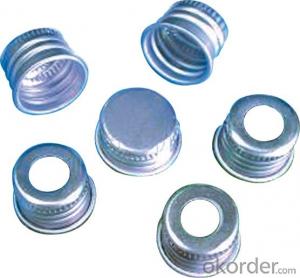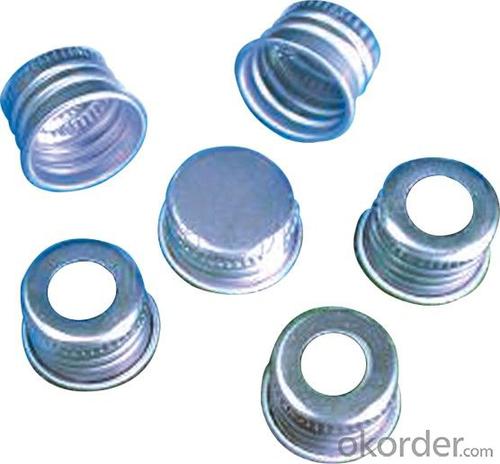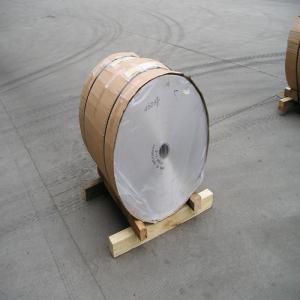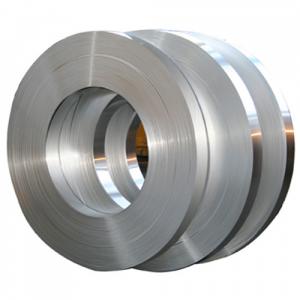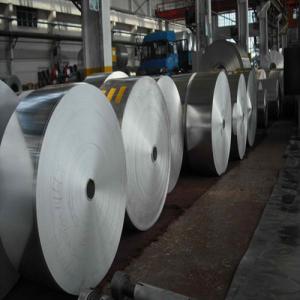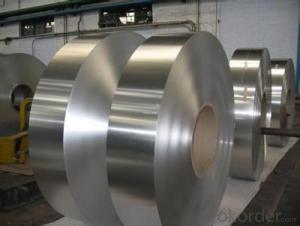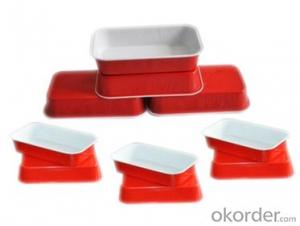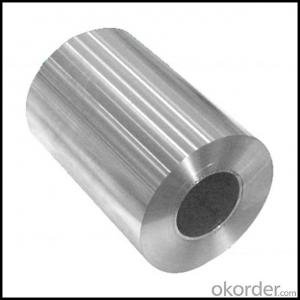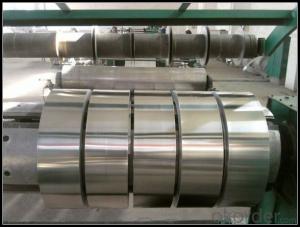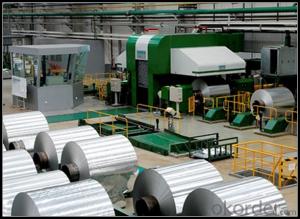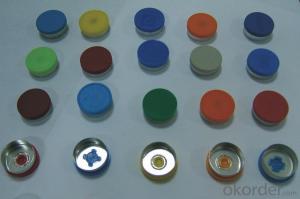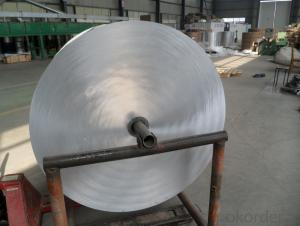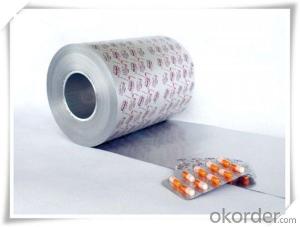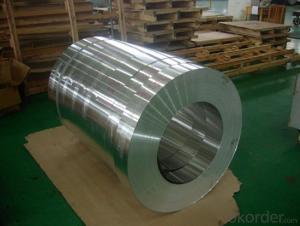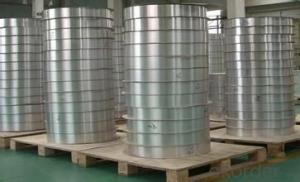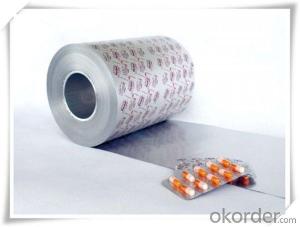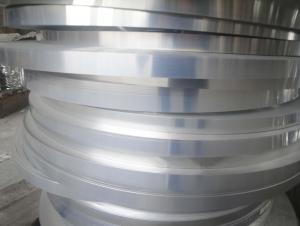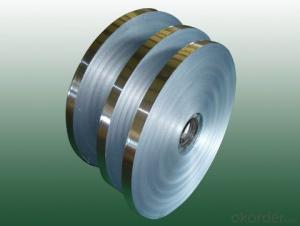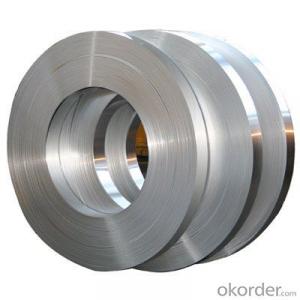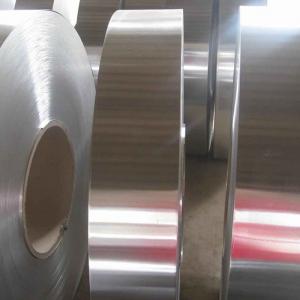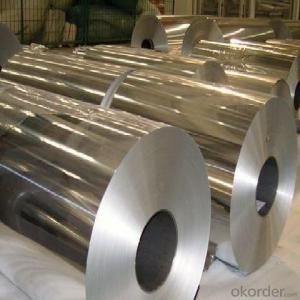Aluminum Flat Strips for Pharmaceutical Bottle Cap
- Loading Port:
- China Main Port
- Payment Terms:
- TT or LC
- Min Order Qty:
- -
- Supply Capability:
- 500 Tons m.t./month
OKorder Service Pledge
OKorder Financial Service
You Might Also Like
1.Description
Aluminum strip is widely used in industry, such as packaging & building industry. Because the good anti heat and anti wet specification. it's very good for pharmaceutical bottle caps. Normally it's coated lacquer, coating thickness is around 4~5mic.
2.Specification and Application
Specification
| Alloy | 8011 |
| Temper | H12/ H14/ H16 |
| Process | DC |
| Thickness | 0.17~0.25mm |
| Width | As required |
| Core ID | As required |
Property
| Tensile strength | ≥120Mpa |
| Elongation | ≥2% |
| Tolerance of size | As GB Standard |
3. Advantages
We've been specialized in aluminium for more than ten years, we know this product very well, and we have good finacial support from government. And also flexible payment term and fast delivery.
4. Pictures
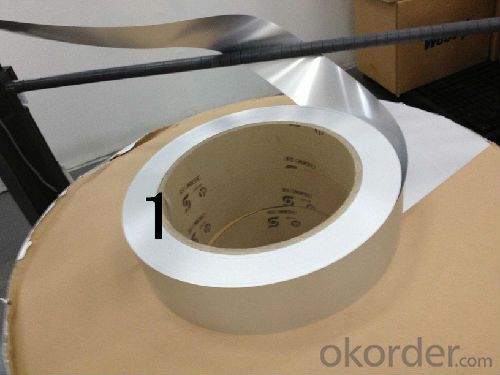
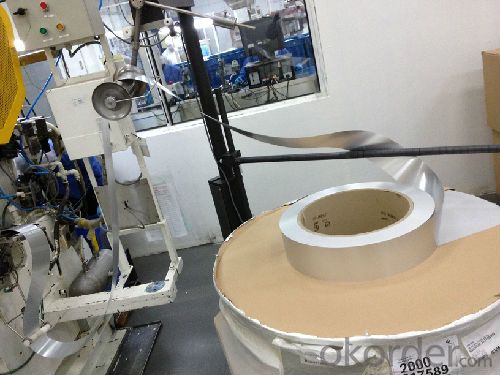
5. FAQ
1) What is your delivery time?
Our regular production time is over 30 days, It depends on the order quantity also.
2) What is your payment term?
We accept T/T, LC at sight, Usance LC 30, 60, 90, 120, 180 DAYS.
3) What is your price structure?
Our price is based on Shanghai Metal Price(SMM), not LME, but we could offer LME+ Conversion for your reference.
4) What is your minimum order quantity?
It's 3tons per size.
- Q: What types of aluminum strips are known for their durability and longevity?
- <p>Yes, there are several types of aluminum strips known for their durability and longevity. These include 3003-H14, 5052-H32, and 6061-T6 aluminum alloys. 3003-H14 is known for its excellent corrosion resistance and formability, making it ideal for applications requiring high durability. 5052-H32 offers good strength, corrosion resistance, and weldability, suitable for marine and structural applications. 6061-T6 is valued for its high strength-to-weight ratio and is commonly used in aerospace and automotive industries where long-lasting performance is crucial. Proper surface treatments and coatings can further enhance the durability and longevity of aluminum strips.</p>
- Q: Is it possible to use aluminum strips as a material for wall cladding?
- <p>Yes, aluminum strips can be used for wall cladding. They are lightweight, durable, and resistant to corrosion, making them suitable for both interior and exterior applications. Aluminum strips are also easy to install and maintain, and they can be painted or finished in various ways to match different architectural styles. However, it's important to ensure that the aluminum is of high quality and that the installation is done correctly to achieve a secure and aesthetically pleasing result.</p>
- Q: What types of aluminum alloys have higher tensile strength compared to others?
- <p>Yes, certain aluminum alloys exhibit superior tensile strength compared to others. For instance, 7075 aluminum alloy, known for its high strength, is often used in aerospace applications. It has a tensile strength of around 524 MPa. Another strong alloy is 2024, which is used in aircraft structures and has a tensile strength of about 425 MPa. These alloys achieve their strength through heat treatment and alloying elements like copper, magnesium, and zinc, which enhance their mechanical properties.</p>
- Q: This question asks for advice on choosing high-quality aluminum strip roofing materials.
- <p>When selecting quality aluminum strip roofing materials, consider the following tips: 1. Gauge Thickness: Opt for a thicker gauge for increased durability and resistance to weathering. 2. Coating: Look for materials with a protective coating, such as Kynar 500 or Hylar 5000, which offer superior resistance to fading and chalking. 3. Color Options: Choose materials with a wide range of color options to match your home's aesthetic. 4. Energy Efficiency: Select materials with high solar reflectance to reduce cooling costs. 5. Manufacturer Reputation: Research the reputation of the manufacturer for quality and reliability. 6. Certifications: Ensure the materials meet industry standards and certifications, such as the American Society for Testing and Materials (ASTM). 7. Warranty: A good warranty is a sign of confidence in the product's quality and longevity. 8. Installation: Consider the ease of installation and whether the material requires specialized tools or techniques.</p>
- Q: Is it possible to use aluminum strips for the exterior cladding of a building's walls?
- <p>Yes, aluminum strips can be used for exterior wall cladding. They are lightweight, durable, and resistant to weather and corrosion, making them suitable for exterior applications. Aluminum strips can also be painted or coated to match various architectural styles and can be easily installed. However, it's important to ensure that the aluminum is of high quality and properly installed to prevent issues like water infiltration or structural damage. Always consult with a professional to determine if aluminum strips are the best choice for your specific project.</p>
- Q: What are the drawbacks or negative aspects associated with the use of aluminum strips?
- <p>The disadvantages of using aluminum strips include their relatively low strength compared to some other metals, making them less suitable for heavy-duty applications. They can also be prone to corrosion, especially in humid environments, which can reduce their lifespan. Additionally, aluminum strips may not be as rigid as other materials, leading to potential issues with structural integrity. Lastly, while aluminum is recyclable, the recycling process can be energy-intensive, and the environmental impact of its production, including greenhouse gas emissions, should be considered.</p>
- Q: Can aluminum foil be used instead of aluminum strips in specific applications?
- <p>Yes, aluminum foil can be used as a substitute for aluminum strips in certain applications, particularly in DIY projects or crafts where the structural strength requirements are not high. However, it's important to note that aluminum foil is thinner and less rigid than aluminum strips, which may limit its use in applications requiring greater strength or durability. Always consider the specific requirements of your project before deciding to use aluminum foil as a substitute.</p>
- Q: Is it feasible to recycle aluminum strips?
- <p>Yes, aluminum strips can be recycled easily. Aluminum is one of the most recycled materials due to its lightweight, high strength, and the energy efficiency of the recycling process. The recycling of aluminum saves up to 95% of the energy needed to produce new aluminum from raw materials. Aluminum recycling is also beneficial as it reduces waste in landfills and conserves natural resources. The process involves melting the aluminum, which is much less energy-intensive than mining and refining bauxite. Recycled aluminum is used in various products, from cans to car parts, demonstrating its versatility and the ease of recycling.</p>
- Q: What types of aluminum strips are more appropriate for commercial use?
- <p>Yes, there are specific types of aluminum strips that are more suitable for commercial applications. These include 1100 series aluminum strips, known for their high purity and excellent formability, making them ideal for general commercial purposes. 3003 series aluminum strips are also popular due to their enhanced corrosion resistance and formability, suitable for applications requiring moderate strength and good workability. Additionally, 5052 series aluminum strips offer good corrosion resistance and weldability, making them suitable for applications in the marine and transportation industries. The choice of aluminum strip depends on the specific requirements of the commercial application, such as strength, corrosion resistance, and formability.</p>
- Q: What are the specific types of coatings applied to aluminum strips to enhance their durability?
- <p>Yes, there are specific coatings used for aluminum strips to increase their durability. These include anodizing, which forms a protective oxide layer on the surface, and various chemical conversion coatings like chromate and phosphate treatments. Additionally, organic coatings such as polyester, epoxy, and acrylic can be applied for corrosion resistance and improved surface properties. Physical vapor deposition (PVD) and hot-dip galvanizing are also used for enhanced durability and protection against environmental factors.</p>
Send your message to us
Aluminum Flat Strips for Pharmaceutical Bottle Cap
- Loading Port:
- China Main Port
- Payment Terms:
- TT or LC
- Min Order Qty:
- -
- Supply Capability:
- 500 Tons m.t./month
OKorder Service Pledge
OKorder Financial Service
Similar products
Hot products
Hot Searches
Related keywords
